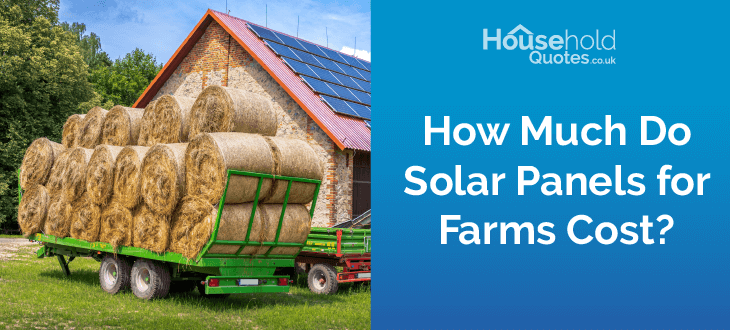Answer these simple questions and we will find you the BEST prices
Which type of solar quotes do you need?
It only takes 30 seconds
100% free with no obligation

Get up to 4 quotes by filling in only 1 quick form

Compare quotes and find yourself the best deal

Increase the value of your home by installing solar panels
- Householdquotes.co.uk
- Solar Panels
- Solar Panels For Farms
Solar Panels For Farms in the UK: 2025 Guide


Solar panels are a technology capable of transforming the free and unlimited energy from sunlight into electricity that can be used to power buildings and even farms. This allows them to provide a reliable and lasting source of electricity that is simultaneously cost-effective, efficient and protects the environment.
Furthermore, solar panels for farms can be installed and benefit farmers and landowners in different ways, such as by obtaining unlimited renewable energy that can be exported back to the grid through the Smart Export Guarantee, potentially becoming an important source of revenue that can also lower energy costs and carbon emissions.
Given their advantages, solar panels have been experiencing exponential growth and rising popularity in recent years. In this article, we’ll answer all of the questions relating to solar panels for farms, their cost, any grants available and their overall suitability for farms.
While we can give you a good idea of how efficient solar panels installed at your home may be, you can only get a truly accurate assessment by getting advice from a certified solar installer. This is something we can help you with.
In order to get the best solar panels for farms on the market and avoid spending hours researching for solar installers near you, simply spend a minute or two filling out our short form and we’ll put you in touch with up to 4 solar installers in your area. Click the button below to get started.
Fill in the form in just 1 minute
How many solar panels do I need for my farm?
As with everything, the number of solar panels for a specific farm will depend on a number of factors, such as the size and type of farm, the amount of energy that is needed and the amount of sunlight that the farm receives.
The type of farm plays a decisive role in the number of solar panels for farms. In the case of a hog farm, it would be necessary to install about 64 panels to produce 3000 KWh per month, while in the case of a general farm, it will again depend on the size of the farm in itself and its energy consumption.
In the table below, we have elaborated a guide that shows how many solar panels are needed for farms that are 1 acre, 2 acres and 3 acres in size, and the KWh produced by the specific number of solar panels. Overall, in general, farms require more energy than a single household.
| Farm type | Size | Number of solar panels needed | kWh roduced |
|---|---|---|---|
| Hog Farm | 1 acre | 21 | 1000 kWh per month |
| Hog Farm | 2 acres | 42 | 2000 kWh per month |
| Hog Farm | 3 acres | 63 | 3000 kWh per month |
| General Farm | 1 acre | Varies based on energy needs | Varies based on energy needs |
| General Farm | 2 acres | Varies based on energy needs | Varies based on energy needs |
| General Farm | 3 acres | Varies based on energy needs | Varies based on energy needs |
| Solar Farm | 1 acre | 2,000 | Varies based on panel wattage and peak sunlight hours |
| Solar Farm | 2 acres | 4,000 | Varies based on panel wattage and peak sunlight hours |
| Solar Farm | 3 acres | 6,000 | Varies based on panel wattage and peak sunlight hours |
To determine how many solar panels are needed for a specific farm, it is best to consult with a specialist in the field who can provide a more accurate estimate based on the farm's energy needs and other factors.
How much would it cost?
The cost of solar panels for farms in the UK will depend on a number of factors, including the size of the solar panel system, the type of solar panel, and the location.
Moreover, the cost of the installation in itself is also an important factor to consider since it greatly affects the final cost of solar panels for farms. Typically, the installation costs will also vary depending on the farm’s location, the size and the complexity of the installation procedure.
Having said this, a standard 250W solar panel in 2025 costs £400-£500, but the cost can vary depending on the type and size of the whole system. An average system size of 4kW will cost around £6,000 to install.
Optional extras, such as costs of solar batteries for storage and solar monitoring devices, can also add to the overall cost.
Are there any solar grants for farms?
Luckily, despite the costs previously mentioned, farm owners who opt for solar panels for their farms can benefit from a number of government grants such as the Smart Export Guarantee (SEG), the Energy Company Obligation 4 (ECO4) scheme or the 0% VAT scheme among others.
For instance, the SEG is a UK government initiative that allows farm owners to export excess energy back to the grid and receive a payment of about 5-6p per kWh in return. Nevertheless, it is important to note that the SEG is an export tariff that will only provide money for the energy sold to the grid.
The Animal Health and Welfare Infrastructure grants provide support for farmers to improve animal health and welfare infrastructure. These grants can potentially cover up to a maximum rate of 40% for the installation of rooftop solar PV panels, for instance.
Other interesting initiatives include the 0% VAT scheme which will run until March 2027 and is available in England, Scotland and Wales and offers a 20% saving on the cost of solar panels or the ECO4 scheme, which provides grants that cover up to 100% of the cost for the installation of solar panels for homeowners in England, Scotland and Wales.
These schemes make them an attractive and affordable option for homeowners and businesses alike. Therefore, solar panels are a great way of becoming increasingly energy-sufficient, and sustainable and can even provide attractive advantages such as grants, profits and savings.
Are solar panels suitable for farms?
Overall, as it has been explained above, the installation of solar panels for farms allows for a number of advantages, such as an unlimited supply of green and renewable energy that will lower your farm’s energy bills and carbon footprint, increase its energy efficiency, take advantage of the grants available through the numerous schemes available and even profits, as the energy surplus produced by solar panels can be exported back to the grid in exchange for money.
Despite these benefits, not every farm is identical and has the same needs. For instance, the cost of solar panels will depend on factors such as location, energy needs, the complexity of the installation process or the solar panel system required.
These factors will likely determine the suitability of solar panels for a specific farm. Nevertheless, it is advisable to get in contact with a professional in the field to get the necessary advice and insight.
Luckily, we are here to help you by offering up to 4 quotes so you can rest assured that you are getting the best advice and avoid the hassle of doing all the hard work of researching by yourself.
Click the link below to easily get started!
Fill in the form in just 1 minute
FAQ
Agrivoltaics, solar PV installations and direct-usage solar systems are all suitable for farms and allow them to obtain revenue, sustainable and clean energy and can even contribute to the farm’s overall preservation. It is important to note that the suitability of these solar panel systems for farms may vary depending on the specific circumstances of the installation.
Solar panels are usually included in your home insurance policy, but it is important to check with your insurance provider to ensure that your policy covers the installation of solar panels. Consult a solar engineer to find out if insurance providers require you to increase your coverage or add a separate policy to cover the installation of solar panels.
Most reliable solar panel manufacturers in the UK offer a 20-25-year warranty for their solar panels. Consult a local solar engineer which solar panel system suits your farm.
In the UK, both agricultural and solar farms require planning permission from the local planning authority (LPA) or from the Secretary of State, depending on their size. Also, you could apply for a grant to get solar panels for your farm for cheap or for free!

Alejandro, a copywriter at Household Quotes with a background in law and content creation, is passionate about sustainable and affordable home improvements, and how the EU is adapting its policies to combat climate change.
